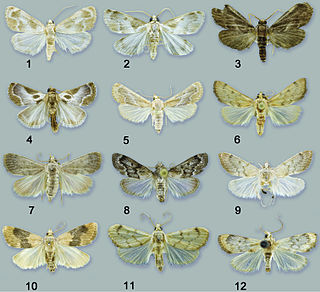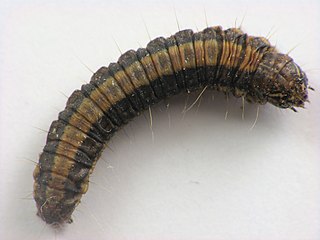
Anageshna is a monotypic moth genus of the family Crambidae described by Eugene G. Munroe in 1956. Its only species, Anageshna primordialis, the yellow-spotted webworm, was described by Harrison Gray Dyar Jr. in 1907. It is found in the US states of Alabama, Arkansas, Arizona, Florida, Georgia, Iowa, Illinois, Kansas, Louisiana, Massachusetts, Maryland, Maine, Minnesota, Missouri, Mississippi, North Carolina, New Hampshire, New Jersey, New York, Ohio, Oklahoma, Pennsylvania, South Carolina, Texas, Virginia and West Virginia.
Hydropionea is a genus of moths of the family Crambidae. The 13 described species are distributed in Central and South America.

Neoleucinodes is a genus of snout moths of the subfamily Spilomelinae in the family Crambidae. The genus was described by Hahn William Capps in 1948 as a Neotropical split-off of the Old World genus Leucinodes.

Schacontia is a genus of moths of the family Crambidae described by Harrison Gray Dyar Jr. in 1914.

The Epipaschiinae are a subfamily of snout moths. More than 720 species are known today, which are found mainly in the tropics and subtropics. Some occur in temperate regions, but the subfamily is apparently completely absent from Europe, at least as native species. A few Epipaschiinae are crop pests that may occasionally become economically significant.
Anthopteryx is a monotypic snout moth described by Harrison Gray Dyar Jr., an American entomologist, in 1914. Its single species, Anthopteryx irichampa, described in the same publication, is found in Panama.

Dioryctria ponderosae, the ponderosa twig moth, is a moth of the family Pyralidae. The species was first described by Harrison Gray Dyar Jr. in 1914. It is found in North America from Washington and Montana south to California and northern Mexico.
Chorrera idiotes is a species of snout moth. It was described by Harrison Gray Dyar Jr. in 1914. It is found in Panama.
Craftsia is a monotypic snout moth genus. It was described by Harrison Gray Dyar Jr. in 1914, and contains the species Craftsia vaetta. It is found in Panama.
Deopteryx is a genus of snout moths. It was described by Harrison Gray Dyar Jr. in 1914, and contains the species Deopteryx hypenetes. It is found in Panama.
Dioryctria erythropasa is a species of snout moth in the genus Dioryctria. It was described by Harrison Gray Dyar Jr. in 1914 and is found from Arizona south along the Mexican Pacific coast to Central America.
Gephyrella is a monotypic snout moth genus. It was described by Harrison Gray Dyar Jr. in 1914, and contains the species Gephyrella parsimonalis. It is found in Panama.
Glossopaschia is a monotypic snout moth genus. It was described by Harrison Gray Dyar Jr. in 1914 and contains the species Glossopaschia caenoses. It is found in Panama.
Moerbes is a monotypic snout moth genus described by Harrison Gray Dyar Jr. in 1914. Its single species, Moerbes dryopella, was described by William Schaus in 1913, originally as Zophodia dryopella. It was subsequently moved under the genus Moerbes by Dyar. It is found in Panama.

Glaphyriinae is a subfamily of the lepidopteran family Crambidae. It was described by William Trowbridge Merrifield Forbes in 1923. The subfamily currently comprises 509 species in 75 genera.

Midilinae is a subfamily of the lepidopteran family Crambidae. It was described by Eugene G. Munroe in 1958. The 11 genera altogether comprise 59 species, with the majority of them occurring in the Neotropical realm, whereas the species of the genera Dolichobela and Styphlolepis are found in Australia.
Pseudoligostigma enareralis is a moth in the family Crambidae described by Harrison Gray Dyar Jr. in 1914. It is found from Costa Rica to central Panama.
Neurophyseta purifactalis is a moth in the family Crambidae. It was described by Harrison Gray Dyar Jr. in 1914. It is found in Costa Rica and Panama.
Hileithia invidiosa is a species of moth in the family Crambidae. It was described by Harrison Gray Dyar Jr. in 1914. It is found in Panama.
Sufetula diminutalis is a snout moth in the subfamily Lathrotelinae of the family Crambidae. It was described by Francis Walker in 1866 in the genus Isopteryx from material collected in Honduras.






